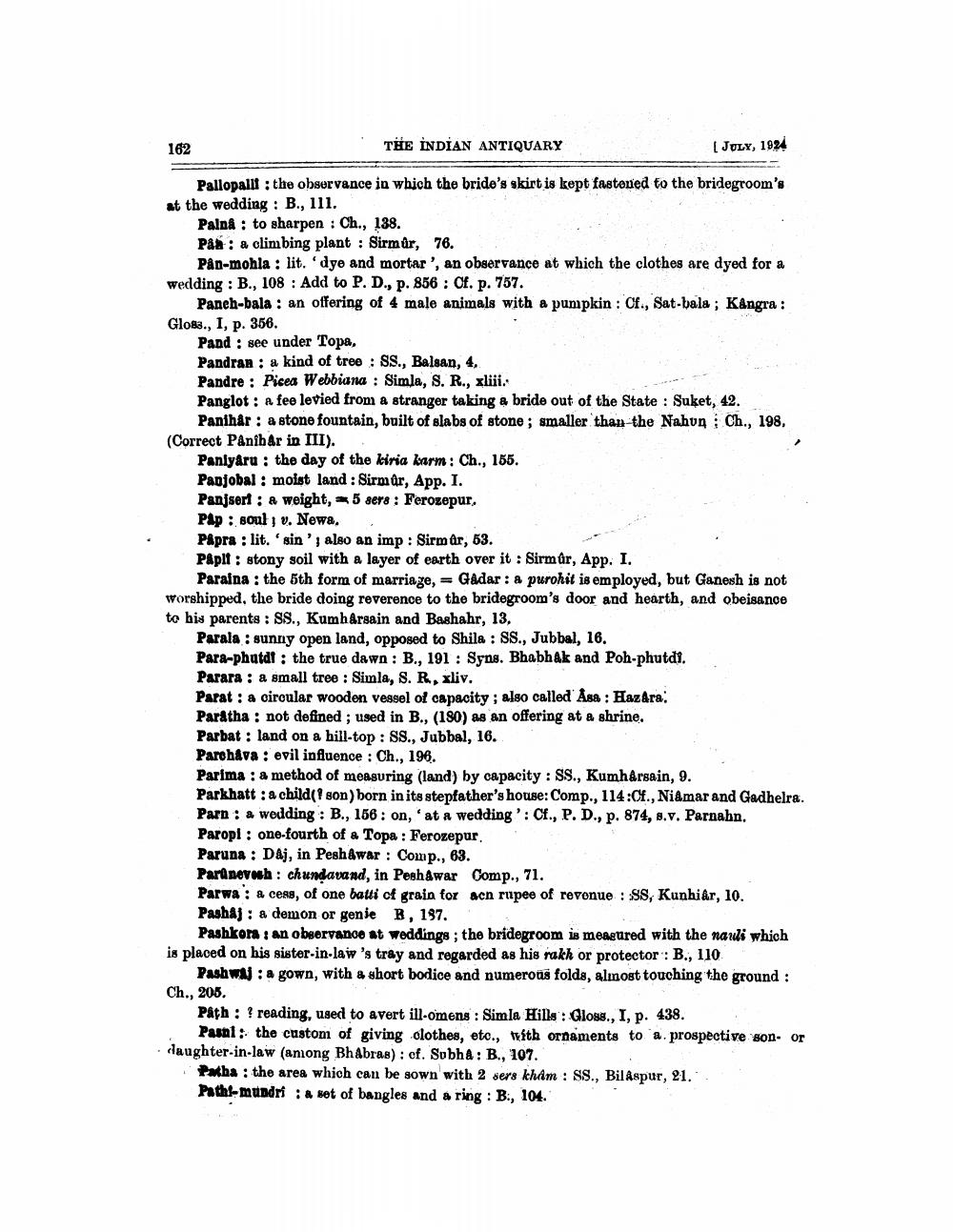________________
THE INDIAN ANTIQUARY
[JULY, 1924
Pallopalli: the observance in which the bride's skirt is kept fastened to the bridegroom's at the wedding: B., 111.
Palna: to sharpen : Ch., 138.
Pân: a climbing plant: Sirmûr, 76.
162
Pân-mohla lit. 'dye and mortar', an observance at which the clothes are dyed for a wedding: B., 108: Add to P. D., p. 856: Cf. p. 757.
Panch-bala: an offering of 4 male animals with a pumpkin : Cf., Sat-bala; Kangra : Gloss., I, p. 356.
Pand see under Topa,
Pandran a kind of tree: SS., Balsan, 4,
Pandre Picea Webbiana: Simla, S. R., xliii.
Panglot: a fee levied from a stranger taking a bride out of the State: Suket, 42. Panihar: a stone fountain, built of slabs of stone; smaller than the Nahun (Correct Pânîbâr in III).
Ch., 198,
Paniyaru: the day of the kiria karm: Ch., 155.
Panjobal moist land: Sirmûr, App. I.
Panjsert a weight, 5 sers: Ferozepur,
Pap: soul; v. Newa,
Papra: lit. 'sin'; also an imp: Sirmûr, 53.
Papli: stony soil with a layer of earth over it: Sirmûr, App. I.
Paraina: the 5th form of marriage, Gadar: a purohit is employed, but Ganesh is not worshipped, the bride doing reverence to the bridegroom's door and hearth, and obeisance to his parents: SS., Kumharsain and Bashahr, 13,
Parala: sunny open land, opposed to Shila : SS., Jubbal, 16.
Para-phutdi: the true dawn: B., 191: Syns. Bhabhak and Poh-phutdi.
Parara: a small tree: Simla, S. R., xliv.
Parat: a circular wooden vessel of capacity; also called Asa: Hazara:
Paratha: not defined; used in B., (180) as an offering at a shrine.
Parbat: land on a hill-top: SS., Jubbal, 16.
Parchava: evil influence: Ch., 196.
Parima: a method of measuring (land) by capacity: SS., Kumharsain, 9.
Parkhatt: a child(? son) born in its stepfather's house: Comp., 114:Cf., Niâmar and Gadhelra. Parn: a wedding: B., 156: on, at a wedding': Cf., P. D., p. 874, s.v. Parnahn.
Paropi: one-fourth of a Topa: Ferozepur.
Paruna: Daj, in Peshawar: Comp., 63.
Paranevesh: chundavand, in Peshawar Comp., 71.
Parwa: a cess, of one batti of grain for acn rupee of revenue: SS, Kunhiâr, 10. Pashaj: a demon or genie B, 187.
Pashkora : an observance at weddings; the bridegroom is measured with the nauli which
is placed on his sister-in-law's tray and regarded as his rakh or protector: B., 110
Pashwaj: a gown, with a short bodice and numerous folds, almost touching the ground: Ch., 205.
I, p.
438.
reading, used to avert ill-omens: Simla Hills: Gloss.,!
Path Pasal: the custom of giving clothes, etc., with ornaments to a prospective son- or daughter-in-law (aniong Bhâbras): of. Subha: B., 107.
Patha: the area which can be sown with 2 sers khâm: SS., Bilaspur, 21. Pathi-mundri a set of bangles and a ring: B., 104.




